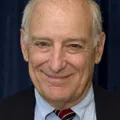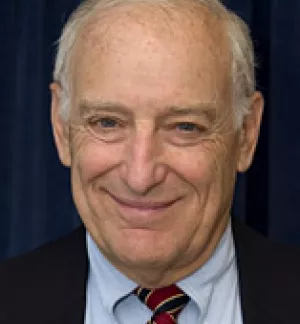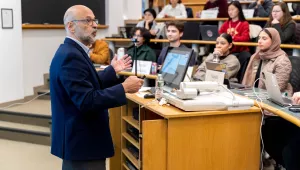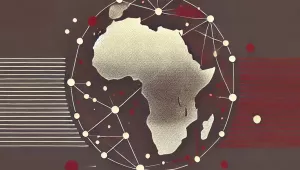By neglecting Nigeria, the Bush administration has missed repeated opportunities to strengthen democracy in Africa's most populous, most fractured and most important country. This failure is particularly telling as millions of Nigerians prepare to vote tomorrow for president and 469 national senatorial and national assembly seats (some opposition parties have threatened to boycott the poll; they want the vote postponed).
Last Saturday, violence and widespread cheating marred elections for 36 state governors and the members of 36 state assemblies. Observers fear an equally disorganized and ill-disciplined poll this weekend, especially after a last-minute Supreme Court decision to permit a controversial candidate to contest the presidency.
Holding reasonably free and fair national elections tomorrow would be good for Nigeria's stability and prosperity, and equally important for bolstering good governance throughout Africa. Moreover, Nigeriasupplies 8.5 percent of theUnited States' annual oil imports and more than 3 percent of total world production. Half of its people are Muslims; Washington has worried about their potential support for al-Qaida, especially after this week's Islamist attack inKano, Nigeria's largest Muslim city.
It would have been helpful indeed for Nigerian President Olusegun Obasanjo to be reminded how much Washington cares about democracy in his country and on the continent, and how decisively official vote-rigging or an otherwise flawed electoral experience would set Nigeria andAfrica back. The cliche "As Nigeria goes, so goes Africa" reflects reality.
Washington has also been spending paltry sums - $15 million over the last three years - to support democracy and governance in Nigeria. There have been few high-level visits to Nigeria and little effort devoted to encouraging a successful and transparent transition.
Tomorrow's presidential contest pits Mr. Obasanjo's hand-picked nominee - Umaru Yar'Adua, governor of Katsina state - against Gen. Muhammadu Buhari, a tough-minded martinet who ruled Nigeria from 1983 to 1985. A third candidate, Vice President Atiku Abubakar, accused of corruption by Mr. Obasanjo, was prevented from running until the Supreme Court reinstated him this week. All three major presidential candidates (there are 25 others) are Muslims.
There is much at stake. The presidential contest is costing each of the three major candidates about $100 million. Contests for the House and the Senate are also costly. Votes will be bought and sold. The names of some voters will not be on the registration lists. More violence is likely. The count will be questionable.
Will the election be fair, or at least credible? If at least somewhat plausible, the vote results will be welcomed and Nigeria (and Africa) will move forward. If judged fraudulent and rigged by local and international observers, and by Nigerians, pitched battles could occur. Then Nigeria's fragile democracy, a mere 8 years old, will be jeopardized.
Because Nigeria's three oil-producing states are already violent, with frequent attacks against oil installations and foreign companies, intense clashes are expected there, in Nigeria's south. Mr. Yar'Adua's vice presidential running mate, Goodluck Ebele Jonathan, is from one of the key petroleum states. If he and Mr. Yar'Adua lose, protests could turn nasty. Renewed attacks would affect oil production adversely. In 2006, Nigerian exports were down 25 percent from 2005, thanks to attacks on oil wells and pipelines.
Although the Bush administration has failed to involve itself effectively in tomorrow's elections, it can still do some good by attempting to influence the resulting Nigerian government. It should create a joint U.S.-Nigerian Commission (along the lines of the U.S.-China Commission) to keep Nigerian questions at the head of diplomatic and corporate queues. It should promise expanded assistance for peacemaking within Nigeria, for conflict resolution in the oil-producing region, and to help Nigerians rebuild their destroyed agricultural sector. Nigeria also needs refineries to produce gas and diesel for the local market; Washington can help there, too.
Most of all, if Nigeria and Africa are to advance, the United States could well help Nigerians to strengthen their weak rule of law and curb runaway corruption - two large and difficult tasks. Given Nigeria's importance to the African continent, globally, and for U.S. energy security, that is the least that Washington should do.
By neglecting Nigeria, the Bush administration has missed repeated opportunities to strengthen democracy in Africa's most populous, most fractured and most important country. This failure is particularly telling as millions of Nigerians prepare to vote tomorrow for president and 469 national senatorial and national assembly seats (some opposition parties have threatened to boycott the poll; they want the vote postponed).
Last Saturday, violence and widespread cheating marred elections for 36 state governors and the members of 36 state assemblies. Observers fear an equally disorganized and ill-disciplined poll this weekend, especially after a last-minute Supreme Court decision to permit a controversial candidate to contest the presidency.
Holding reasonably free and fair national elections tomorrow would be good for Nigeria's stability and prosperity, and equally important for bolstering good governance throughout Africa. Moreover, Nigeria supplies 8.5 percent of the United States' annual oil imports and more than 3 percent of total world production. Half of its people are Muslims; Washington has worried about their potential support for al-Qaida, especially after this week's Islamist attack in Kano, Nigeria's largest Muslim city.
It would have been helpful indeed for Nigerian President Olusegun Obasanjo to be reminded how much Washington cares about democracy in his country and on the continent, and how decisively official vote-rigging or an otherwise flawed electoral experience would set Nigeria and Africa back. The cliche "As Nigeria goes, so goes Africa" reflects reality.
Washington has also been spending paltry sums - $15 million over the last three years - to support democracy and governance in Nigeria. There have been few high-level visits to Nigeriaand little effort devoted to encouraging a successful and transparent transition.
Tomorrow's presidential contest pits Mr. Obasanjo's hand-picked nominee - Umaru Yar'Adua, governor of Katsina state - against Gen. Muhammadu Buhari, a tough-minded martinet who ruled Nigeria from 1983 to 1985. A third candidate, Vice President Atiku Abubakar, accused of corruption by Mr. Obasanjo, was prevented from running until the Supreme Court reinstated him this week. All three major presidential candidates (there are 25 others) are Muslims.
There is much at stake. The presidential contest is costing each of the three major candidates about $100 million. Contests for the House and the Senate are also costly. Votes will be bought and sold. The names of some voters will not be on the registration lists. More violence is likely. The count will be questionable.
Will the election be fair, or at least credible? If at least somewhat plausible, the vote results will be welcomed and Nigeria(and Africa) will move forward. If judged fraudulent and rigged by local and international observers, and by Nigerians, pitched battles could occur. Then Nigeria's fragile democracy, a mere 8 years old, will be jeopardized.
Because Nigeria's three oil-producing states are already violent, with frequent attacks against oil installations and foreign companies, intense clashes are expected there, inNigeria's south. Mr. Yar'Adua's vice presidential running mate, Goodluck Ebele Jonathan, is from one of the key petroleum states. If he and Mr. Yar'Adua lose, protests could turn nasty. Renewed attacks would affect oil production adversely. In 2006, Nigerian exports were down 25 percent from 2005, thanks to attacks on oil wells and pipelines.
Although the Bush administration has failed to involve itself effectively in tomorrow's elections, it can still do some good by attempting to influence the resulting Nigerian government. It should create a joint U.S.-Nigerian Commission (along the lines of the U.S.-China Commission) to keep Nigerian questions at the head of diplomatic and corporate queues. It should promise expanded assistance for peacemaking within Nigeria, for conflict resolution in the oil-producing region, and to help Nigerians rebuild their destroyed agricultural sector. Nigeria also needs refineries to produce gas and diesel for the local market; Washington can help there, too.
Most of all, if Nigeria and Africa are to advance, the United States could well help Nigerians to strengthen their weak rule of law and curb runaway corruption - two large and difficult tasks. Given Nigeria's importance to the African continent, globally, and for U.S. energy security, that is the least that Washington should do.
Rotberg, Robert. “Nigeria Neglect Carries Cost.” Baltimore Sun, April 20, 2007




